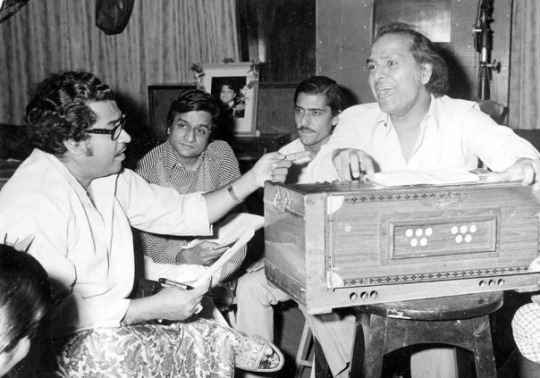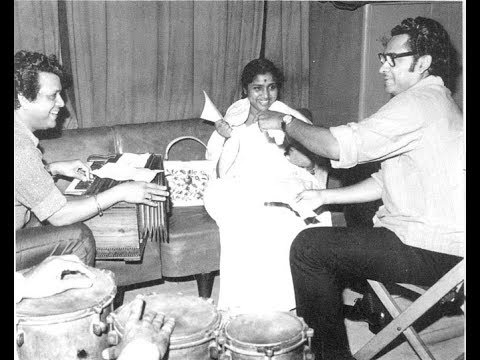#this and Tum kya Mile were the only good songs in this album!!!
Text
Ja Karna Hai Toh Pyaar Kar
Zid Poori Phir Ik Baar Kar
Manmarzi Karke Dekh Le
Badle Mein Sab Kuchh Haar Kar
Marzi Teri Jee Bhar Le Aa
Ve Kamleya Mere Nadaan Dil
#rocky aur rani ki prem kahani#this and Tum kya Mile were the only good songs in this album!!!#hindi poetry#punjabi poetry#urdu poetry#amitabh bhattacharya
5 notes
·
View notes
Text
Kishore Kumar and Shankar Jaikishen- Hysteria that did not coincide
Courtesy
http://arghyatext.blogspot.com/2012/07/18-songs-in-first-13-years-and-then-87.html
No song in the first 8 years of mutual co-existance in the music kingdom ,18 songs in the next 13 years of association and then, 87 songs in last 17 years: the association of Shankar Jaikishen with Kishore Kumar has various interesting aspects. Another intriguing part is, for the first 13 years, SJ were the uncrowned king of Hindi film music and Kishore Kumar a non-considerate in playback singing and in the next 17 years, well, almost vice versa. “Almost” is because Jaikishen- the more prominent of the duo, died in 1971, and upto 1986, Shankar single handedly kept the S-J flag flying. As the musical parallelism goes, many still believe, it was Jaikishen with whom the camaraderie of Kishore would have blended better- and the proof was there with “Zindagi ek safar hai suhana”, the chartbuster Jaikishen had made with Kishore just months after the former passed away. But the fact is, out of 105 songs Kishore recorded under SJ baton, almost 70 songs came for Shankar only, owing to Jaikishen’s early demise.
Kishore Kumar with Asha Bhosle and Jaikishen
Alongwith Rafi-R D Burman and Asha Bhosle-Ravi, Kishore Kumar-Shankar Jaikishen combo has been highly neglected in Hindi film music history, perhaps owing to the reason that the fan groups of the MD and the singer never formed a common set.With their clear cut preference to the trio of Rafi-Mukesh-Manna, Shankar Jaikishen ruled the film fraternity in the 1960s. They could be cult and traditional with equal ease, insisted on heavy orchestration, composed for the poster boys of Hindi cinema and maintained super Public Relations where their counterparts like Madan Mohan, O P Nayyar or S D Burman were not the experts at. They did not want to look beyond their comfort set of singers right from the very beginning in 1949. It is therefore, you will find hardly any association of them with Hemant, Talat, Geeta or Shamshad right from the 50s through the 60s, except for occasional masterpieces(Ae mere dil kahin aur chal or Yaad kiya dil ne kaha ho tum). So high was the S-J mania that time they managed to compose as many as 7 films for Dev Anand(Patita, Love Marriage, Jab pyar kisise hota hai, Roop ki rani choron ka raja, Asli Naqli, Duniya, Pyar Mohabbat)- a hero who never wanted any MD except S D Burman even outside his home production. So, for Kishore Kumar, his association with S-J was confined within the films where he was the hero himself. All the movies they worked together between 1956 and 1969 were mainly with Kishore Kumar as the protagonist- New Delhi, Begunaah, Shararat, Krorepati and Rangoli. So fascinated were the SJ with the trio of R-M-M, that except for in New Delhi, in all the other films they created space for each of the singers to playback for Kishore. Manna De played back only twice for Kishore- both the occasions came under SJ- Begunaah and Krorepati. Rafi played back for Kishore in Shararat- a movie where Kishore played a double role. There were two movies in that period where SJ did use Kishore for playback- one in Duniya(1968), a duet with Asha Bhosle on Dev Anand and one in Bhai Bahen(1969), again a duet with Manna De on a character artist.With Aradhana released in 1969 and the equation changing a bit, S-J started using Kishore sporadically in movies like Umang and Tum haseen main jawan, still sticking mainly to their comfortable “trio” and making some space for the newly arrived sensation. By 1971, the producers started having their say on Kishore Kumar on the MDs. SJ, always known to abide by the industry trends, started suddenly using Kishore lot more. Kishore Kumar had by then, continued his popularity run with chartbusters in 1970 like Kati Patang, Johny Mera Naam, Sacha Jhutha, Safar, Pavitra Papi, Prem Pujari and Aan Milo Sajna. A force too huge to be ignored by now, Shankar turned on to Kishore for a piano solo in Laal Patthar. “Geet gata hoon main, gungunata hoon main” had Kishore responding to S-J just the way they would have wanted. Alongwith Rafi, Kishore had that elasticity to deliver just the way a MD wanted and not sticking to his own singing gambit. S-J used Kishore in the title track of a Shammi Kapoor starrer in the same year. “Jaane Anjaane”, an otherwise forgettable album, is best remembered today for Manna De’s “Chham chham baaje re payaliya” and Kishore’s “Jaane anjaane log mile”. In Andaaz, the unthinkable happened- with only one single solo in the whole film, Kishore’s “Zindagi ek safar hai suhana” overshadowed all the other songs in the album, including the versions of the same song by Asha and Rafi.S-J, in a spree to check the continuous popularity of younger R D Burman and Laxmikant Pyarelal and older and rejuvenated S D Burman post-Aradhana, started signing movies one after the another in 1971. They had 17 releases in 1971, much more than what RD and SD had done, and almost as good as what LP had done. That was the good part, the bad part was except Andaaz, all the other movies bombed at the box office. Duniya kya jaane, Seema, Ek naari ek brahmachari, Albela, Jawan Mohabbat, Pagla kahin ka came and went. In spite of great songs, Lal Patthar and Mera Naam Joker failed at box office. Jaane Anjaane, Kal aaj aur kal received lukewarm response. Andaaz was the only day-saver, that too thanks to only one superhit. Interestingly, SJ used Kishore in almost all their movies in 1971, except for 2-3 Raj Kapoor and Shammi Kapoor movies. They had four releases of Shammi Kapoor that year, and none faring well, also gave a hint at the star’s declining product life cycle.Kal aaj aur kal was a RK production launching Raj Kapoor’s son Randhir Kapoor. S-J decided to put Kishore Kumar as the voice of young Randhir and made him croon the evergreen beauty “Bhanwre ki gunjan”. Interesting to note that, although the media hypes a lot over Kishore’s association with Rajesh Khanna, Amitabh Bachchan and Dev Anand, it was Randhir Kapoor for whom, in terms of percentage, Kishore Kumar had played back the most. Except for Jeet(1972) and Humrahi(1974), Kishore played back for Randhir Kapoor in all the other movies of the hero- an outstanding achievement between an actor and a singer.Jaikishen passed away in 1971 owing to liver cirrhosis. With Shailendra already gone in 1966, Shankar was left alone to carry forward the glorious torch of the past. With already a declining trend in popularity, SJ held intact only one thing- the Filmfare Awards. They received it in 1970 and 1971 winning over the albums of SD,RD,LP and KA with many eyebrows raised. In 1972, a year truly belonging to Rahul Dev Burman, with mesmerizing albums like Mere Jeevan Sathi, Amar Prem, Parichay, Jawani Deewani, Hare rama hare Krishna and Bombay to Goa, SJ managed to win the Filmfare Award again for Beimaan under lot of controversies. SJ used Kishore Kumar again in almost all their movies except Aan Baan(1972)- a Rajendra Kumar starrer, where they decided to stick to their old gun, Rafi. Kishore delivered his job, giving hits under any circumstances, with “Tum kitni khubsoorat ho”(Jungle mein mangal), “ Saath mein pyara saathi”(Dil Daulat Duniya) and “Aankhon aankhon mein baat hone do”(Aankhon aankhon mein).
Shankar and Kishore Kumar in rehearsal can be seen in the original records of Dil, Daulat Duniya-1972. Pic Courtesy: Rajnikanth Ranchod Pithia ji
The next decade saw gradual decline of Shankar amongst mainstream cinema. After giving music to almost 350 movies, the exhaustion showed. With no Jaikishen, Shankar tried to put his foothold intact with occasional hits in Resham Ki Dori(1974), Sanyasi(1975) and Do Jhoot(1975). Many of Shankar’s hits that time came with Kishore like “Chhatri na khol”(Do Jhoot), “Mere dil mein tu hi tu hai”(International Crook), “Chamka paseena”(Resham ki Dori) and “Tu jahan main wahan”(Garm khoon).Both Shankar and Kishore demised in 1987. While one was given a superstar farewell, the other went away quietly. Quite contradicting to the fact that once, in the 60s, Shankar had actually told in an interview that some songs were not singer Kishore’s “cup of tea”. That time, he was the superstar in music and Kishore was obscure. Time changes fast.But, the fact remains that Shankar Jaikishen were amongst the greatest music directors in Indian Cinema and Kishore Kumar was one of the greatest playback singers. Although their peak periods don’t match, in spite of being contemporaries, they did give us some brilliant output together. Here are my top 10:
Nakhrewali- New Delhi(1956).
Chhotisi yeh duniya- Rangoli(1962).
Rangoli sajaao-Rangoli(1962).
Humlog hai aese deewane- Umang(1970).
Geet gata hoon main- Laal Patthar(1971).
Jaane anjaane log mile- Jaane Anjaane(1971).
Bhanwre ki gunjan-Kal aaj aur kal(1971).
Zindagi ek safar hai suhana-Andaaz(1971).
Saath mein pyara saathi-Dil Daulat Duniya(1972).
Kehta hai dil o mere sanam-Chorni(1980).


0 notes